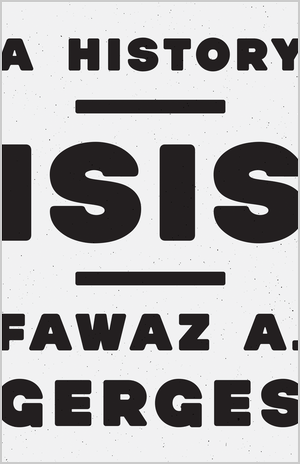The History of the Islamic State, ISIS Daesh
Review of "ISIS - A History" by Fawaz A. Gerges. Princeton University Press, Princeton, 2016.

Similar to the title, Gerges’ work, ISIS, A History is tightly written and narrowly focussed on – mostly – an inside view of the salafi-jihadi militant groups in the Middle East. Depending on the reader’s expectations that can either be a positive attribute or an unfortunate miss concerning the larger context. Or, as in this case, both views can be effectively held at the same time.
As with some other more slanted perspectives Gerges initially focuses on the fault of the Arab governments,
The reliance of Arab regimes on tyranny, widespread corruption, and coercion led to the breakdown of the state-society relationship. Groups such as ISIS exploit this political tyranny…challenging the ideology of the state…presenting a subversive alternative through the reestablishment of the caliphate.
To his credit, Gerges recognizes that the governments are only “in part responsible for the growth of nonstate actors.” Further to that, he identifies the U.S. attack on Iraq as being the main problem with the rise of ISIS. At one point he identifies the effects of the sanctions regime initiated by the U.S. through the UN as exacting “a heavy toll on Iraqis [leading] to an increased religiosity in society….in a country weighted down by war, social turmoil, and economic sanctions.”
Unfortunately that is about as far as he delves into the surrounding geopolitics of ISIS’ creation and rise in power. But proceeding as he does, he successfully details and highlights the people, their personalities, and their interactions from bin Laden and Zawahiri in Afghanistan, through to Zarqawi, Baghdadi, and al-Joulani (the latter a figure I was not at least familiar with) in the al-Qaeda in Iraq, al-Nusra, ISIS melange in Iraq and Syria.
As the personalities and arguments proceed, the actions become more violent, while the focus twists and turns back and forth between the ‘near enemy’ – the Arab governments – and the ‘far enemy’ – essentially the U.S. An interesting smaller focal point for a fair amount of this narrows down to the U.S. prison camps, and even more particularly, the imprisonment of Baghdadi and his supporters in Camp Bucca,
…former detainees compare camp Bucca to an “Al Qaeda school,” an institution that produced jihadists in a factory-like environment. Camp Bucca housed about twenty-four-thousand men…[who] sat at the feet of Salafi-jihadists, who mentored them and converted them en masse to their Islamist ideology.[p. 133]
What these former officers [of the Baath party] have in common is that they were all incarcerated in the US-run prison at Camp Bucca. [p. 163]
ISIS, A History will not provide much information on the surrounding geopolitical factors. Turkey is mentioned as a passageway for militants and supplies ( as always, oil comes into the picture), but does not delve into discussing why they have acted as they have. Israel does not merit a mention in the index, similar to their lack of presence in the media, happy to have the empire of chaos revolve around them while they quietly go about annexing more Palestinian land – and perhaps waiting to see which side they will choose if the Syrian Russia-U.S. proxy war develops into a more serious confrontation.
Saudi Arabia receives some mention, but for a more contextual awareness this work would not be the source to go, as with Turkey, little of its ideological alignments with other Arab/Muslim States and the U.S. is discussed.
Finally, with the writing having ended in 2015 at the debut of the Russian campaign, there is little recognition that this intervention is a large game changer with even larger geopolitical consequences. Gerges recognizes that ISIS has “suffered serious setbacks” and “its ability to go on the offensive had come to an end.”
Ultimately however it remains that “The destruction of the Iraqi state by the U.S. led invasion has had more everlasting consequences on the country than any other cleavage or mutation.”
Gerges’ final words are not positive and foresee ongoing turmoil in the region short of an ability for a “cultural revolution that transforms state and society.” That of course is what is underway with ISIS and its fight against the ‘near’ and ‘far’ enemies, a fight that does appear to have a long future ahead of itself.
Given all that, ISIS, A History is well worth the read. Gerges’ narrow focus on the internal workings of ISIS is well referenced, revealing, and an interesting examination on these militant groups.

